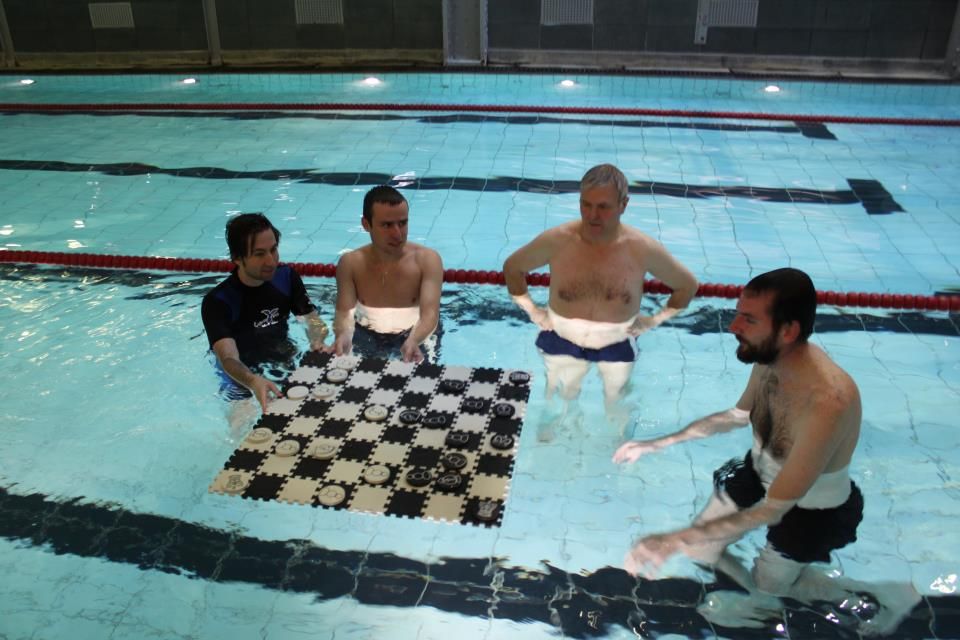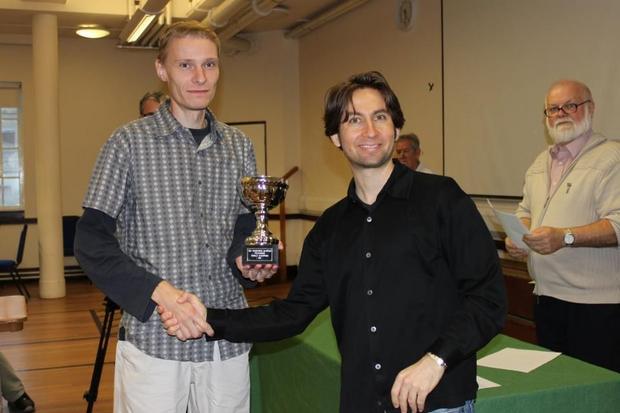
The Mind Sports Olympiad started with a bang and great expectations, but faced hard times; only idealism and total dedication has kept it alive.

The first Mind Sports Olympiad was held at the Royal Festival Hall on London’s South Bank. It was a big event, and as the years went by it got bigger; MSO4 at Alexandra Palace in North London had a massive room filled just with contestants doing the Times crossword.
MSO was the brainchild of David Levy, a former highly ranked chess player who in a moment of self-analysis realised he was no longer in love with the game. That may have been good judgment, because he couldn’t have been more successful at chess than he has been as an author, on both chess and his other field of expertise, artificial intelligence. All or most of his many books can be found on Amazon.
Having said that, Levy is an enthusiastic poker player, and this year he won the 7 card stud.
Levy in particular had a vision of MSO spreading across the world. He had first conceived the idea of a mind sports olympics in 1987, and after the first two or three MSOs, that long incubation period must have seemed worthwhile.
A smaller event was organised at Cambridge in 2001 by the inimitable Aubrey de Grey, although he has been sidetracked somewhat from his beloved Othello by the quest for immortality, or SENS at least. Another event sprung up in the Czech Republic, and it looked as though it might indeed spread across the world, as has the game of snooker under the influence of Barry Hearn.
Just when MSO seemed destined for great things, something went terribly wrong. Levy’s (uncontested) version of events can be found here. Suffice it to say that his betrayal by not only a close friend but someone to whom he was related by marriage left him a rightly embittered man, but with his faithful team headed by Tony Corfe, the event struggled on.
MSO5 was held at London’s South Bank University, and was the last time there was meaningful prize money.
In 2002, the event moved out of the capital for four years: to Loughborough, then three years at Manchester. In 2007, it was held in a church hall at Potters Bar, where Corfe and his family live, then it moved back to London, where it remains, and will be held next year.
Etan Ilfeld from San Francisco entered the chess at MSO7 in Manchester, 2003. He moved to London in 2006 where he studied at Goldsmiths College. He is now a regular member of Tony Corfe’s volunteers as well as the inventor of – uh hum – chess diving, and unlike Pete Burley, who could only manage runner up in the Kamisado tournament, Etan took gold in the inaugural event.
Here he is talking about this year’s event as well as looking forward to the future.
Alexander Baron: How many people entered MSO this year, how many entries in total?
Etan Ilfeld: I’m not sure about unique entries as we haven’t had a chance to process all of the statistics yet, but we had almost 800 total entries (this includes players playing in more than one event; e.g. a player that participates in 6 events, is counted 6 times).
We also had entries from over 30 countries, including Turkeminstan, Poland, Estonia (for which Andres Kuusk won the Pentamind World Championship) and South Africa.
AB: Where is the most action?
EI: The most popular events at MSO are Scrabble and Chess. The Pentamind competition awarded to the best all-around player (taken from his scores in 5 different events). Next year, we’re hoping to bring back Magic the Gathering into the schedule.
AB: What is the sponsorship situation? Have you considered holding or co-hosting another big chess tournament as in 2001 with the Commonwealth Championship?
EI: Sponsorship is a key issue, and we hope to secure a sponsor for future events. Meanwhile, we can confirm that the 16th Mind Sports Olympiad will take place at the same venue, the University of London Union, August 18th to the 27th.
We’re open to co-hosting big events, as long as it can draw a crowd that would be curious to try out some other Mind Sports games.
AB: Over the years, MSO has featured a number of new or relatively new games such as Stratego, Lines of Action, Continuo, Entropy, and now Kamisado. Do you plan on continuing this?
EI: MSO is always happy to give game inventors a chance to teach their games, and if there is a demand for them, to include them into the official MSO program. We always host the Lines of Action, Continuo and Entropy World Championships, and if there is enough demand, we’d like to bring back Stratego and Kamisado as well as classic games such as Dominoes.
I think video games will continue to grow, but board games will remain an important component of games--as they have a social value that cannot be underestimated (it’s much more fun to win a chess game in ‘real’ life than on a virtual board over the internet).
AB: Next year is the Olympics, of course; have you any plans to piggyback on either the Olympics or Paralymics; do you think there is any potential here?
EI: MSO is a unique competition, and I am hoping that with all of the hype for the Olympics, that following the Olympics (our 2011 dates are after the Olympics), we can get some coverage on the importance of exercising the mind.
AB: Etan Ilfeld, thank you very much.

Etan Ilfeld presents the Junior Pentamind trophy to 14 year old Tomasz Bazant of Poland. In the background is Tony Corfe and Josef Kollar.
[The above article was first published September 1, 2011.]
Back To Digital Journal Index